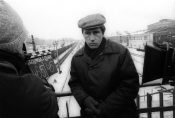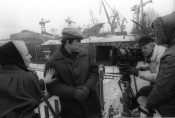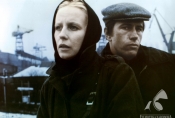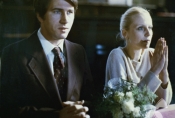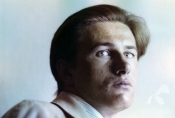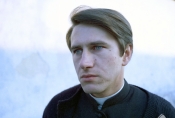Jerzy Radziwiłowicz
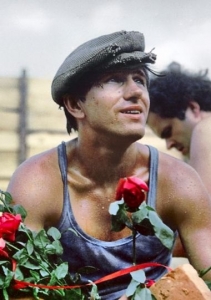
“I have never had any problems with popularity because somehow few people recognise me. I do not even know if I should be annoyed about ir, or happy,” the actor said in the book Wszystko jest lekko dziwne [Everything is a little strange] (2012).
He was born on September 8, 1950 in Warsaw. A graduate of the Acting Department of the National Theatre School (1972). After graduation, he joined the Stary Theatre in Krakow (1972-1996), and then went o to work in the Narodowy Theatre in Warsaw (since 1998). He worked with the best direcotr, suchas Konrad Swinarski, Jerzy Jarocki and Andrzej Wajda, Jerzy Grzegorzewski, Krystian Lupa, Tadeusz Bradecki, Piotr Cieplak.
He made his screen debut in Drzwi w murze/ Door in the Wall (1973) by Stanisław Różewicz, but his first major role was Mateusz Birkut (he also played his son, Maciej Tomczyk) in Człowiek z marmuru/Man of Marble (1976) by Andrzej Wajda. The film about a young film director reconstructing the complicated life of a bricklayer, “leader of the work” from the 1950s, is a great synthesis of Polish post-war history. “Before he was a Stakhanovite, Birkut had had the same advantages and disadvantages which have always been a constant element of humanity, regardless of place and time. Although labelled the hero of socialism, his humility and integrity make him a true hero,” Alberto Moravia wrote after the premiere. For this performance Radziwiłowicz gained not only popularity and critical acclaim, but also two prestigious acting awards at festivals in Brussels and Belgrade (1979). Five years later he reprised his double role in Człowiek z żelaza/Man of Iron (1981), in which Tomczyk becomes one of the instigators of the August 1980 strike in the Gdansk shipyard. In both these films, Wajda partnered him with Krystyna Janda. The duo also starred together in the harrowing drama by Waldemar Krzystek W zawieszeniu/Suspended (1986), a tale of a woman in love with a fugitive Home Army officer hiding from the communist authorities.
Radziwiłowicz has often starred in important films, devoted to crucial and sometimes painful issues: in Bez końca/No End (1984) by Krzysztof Kieślowski set during martial law, he portrays Antoni Zyro, a lawyer preparing to defend a young worker leading a strike, who the day after his own funeral returnes to his house and accompanies the living, at times interfering in their lives; in Śmierć jak kromka chleba/Death Like a Slice of Bread (1994) by Kazimierz Kutz, an attempt to reconstruct the most tragic event of martial law, when nine miners were shot by the police – he is the priest supporting the protesters. In Poznan ‘56 (1996) by Filip Bajon, he is one of the professors stuck in a train wagon during the tragic events of June 28; and in Pokłosie/Aftermath (2012) by Władysław Pasikowski, inspired by the tragic events in Jedwabne, he plays the priest again ¬– a fair and prudent one. He is often cast as members of the clergy: as father Konrad in Ryś (1981) by Stanisław Różewicz, based on the story by Iwaszkiewicz, or as the parish priest in Wino truskawkowe/Strawberry Wine (2007) by Dariusz Jabłoński based on Andrzej Stasiuk's Opowieści galicyjskie [Galician tales]. Radziwiłowicz is a true thespian, he excels regardless of the costume, time or place, regardless of the nature and tone of the story. His diverse roles include Peter Ruprecht, the sixteenth-century knight in Ognisty anioł [Fiery angel] (1985) by Maciej Wojtyszko, Szymon Pietruszka in the film adaptation of Wiesław Myśliwski’s Kamień na kamieniu [Stone on stone] (1995) by Ryszard Ber, or lost a man known at the train station in Zbigniew Kamiński’s underrated film Pani Bovary to ja [I am Madame Bovary] (1977).
Selected filmography
-
1976
MAN OF MARBLE
reż. Andrzej Wajda
-
1981
MAN OF IRON
reż. Andrzej Wajda
